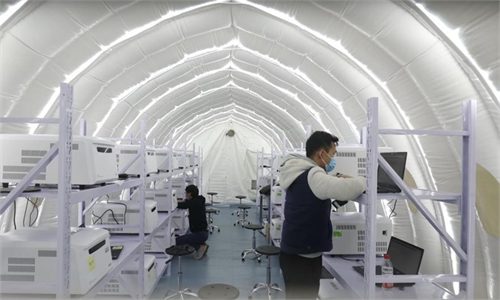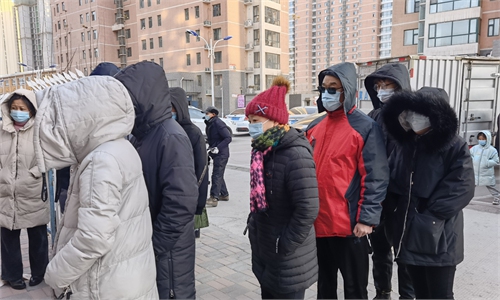Clustered outbreak emerges in Beijing village, officials warn of vulnerability in epidemic control

A community worker (L) measures body temperature for a resident at the entrance of the Hongcheng Huayuan residential compound on Wangquan Street, Shunyi District, Beijing, capital of China, on Dec. 29, 2020. (Xinhua/Ren Chao)
A clustered outbreak of COVID-19 infections has emerged in a village in Beijing, amid warnings that China's villages could be a potential weak spot in the country's epidemic control efforts.
Lianzhuang village in Beijing's Shunyi district has recorded seven COVID-19 infections, including a family of three. Lianzhuang has been completely sealed off and all 968 villagers will undergo nucleic acid testing, Beijing authorities said at a press conference.
As part of efforts to boost epidemic control in villages, Beijing authorities will closely monitor public venues and vulnerable groups such as the elderly and children, nurses and old people's homes.
People are required to register with their health QR code and have their temperatures checked when entering the village, the Beijing Center for Disease Prevention and Control announced Monday.
More efforts will be made by small clinics and pharmacies to screen out those with respiratory diseases. Once potential COVID-19 patients are discovered they will be sent to hospitals for further treatment, the center said. Beijing will also strictly control social gatherings such as weddings and funerals.
The cluster of infections in Lianzhuang came amid the Hebei outbreak, which also appears to have started in rural areas. The province reported 82 new confirmed cases on Monday, many of whom are from villages, with many of the cases related to weddings, funerals and social gatherings.
Beijing's epidemic leading group said the clustered infections in villages have exposed the "vulnerability" of epidemic control in regions between urban and rural areas. They called for the speeding up of epidemiological investigations, screening of loopholes and for the source of infections to be promptly found.
Apart from Hebei and Beijing, the Global Times found several other cities in China have beefed up anti-epidemic controls in villages, such as Southwest China's Sichuan Province and Lanzhou in Northwest China's Gansu Province. They called on villagers to reduce unnecessary travels and social gatherings.
Wang Guangfa, a respiratory expert at Peking University First Hospital, told the Global Times on Monday that villages could be the potential weak spot of China's epidemic control measures, given the living habits, environment and lack of medical facilities in rural areas.
"The coronavirus has posed challenges to the living habits of villagers, as attending weddings, funerals and gatherings, and visiting relatives are part of their daily lives," he said.
The practice of going to small clinics when villagers had fever or cough symptoms, which they regard as a "minor ailment," could also make villages more susceptible to outbreaks as clinics lack the capability to detect, treat and quarantine COVID-19 patients, said Wang, adding that about 80 percent of COVID-19 patients have light symptoms.
Wang also warned that hygiene should be maintained in village-type dry toilets, which carry the risk of causing virus transmission via excreta although we do not have direct evidence yet.
Urgent efforts are required to mobilize villages, experts noted, such as training medical staff from clinics to detect COVID-19 patients and draw up thorough emergency schemes in response to the new emerging outbreak.
Compared with urban areas, rural areas can be more easily controlled in terms of curbing the spread, as villages are usually not as populous as cities, experts said.



